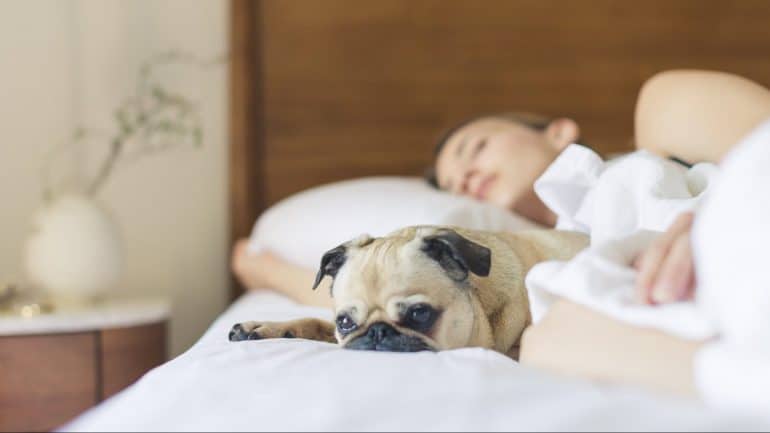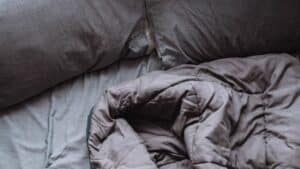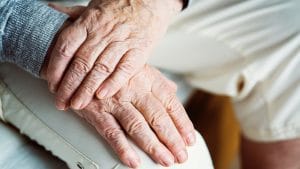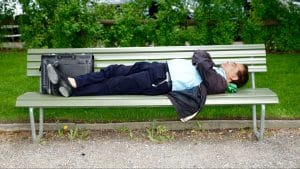Teeth Grinding in Sleep: Symptoms, Causes, and Treatment
written by / April 24, 2022

Teeth grinding in sleep, also known as bruxism, is a common complaint—up to one-third of people experience it at least once in their lives.
Mild forms of the condition, which pass quickly and leave no consequences, can occur due to temporary nervousness or overwork. However, moderate and severe forms of bruxism may be the sign of an underlying disease or health problem.
In most cases, this habit is entirely unconscious. It can occur both during the day and at night. In case of episodic bruxism (e.g., occurring after dental work), there’s usually no need to worry. But if it continues for an extended period, it can damage your teeth and disturb your sleep.
Statistics on Grinding Teeth in Your Sleep
Teeth grinding can occur in people of all ages, genders, and ethnicities.
Statistical data about the number of people with bruxism varies according to the source. For example, while some sources report that between 1% and 3% of people suffer from teeth grinding in their sleep, others suggest the percentage is much larger — around 10%.
And children account for a significant number of cases.
According to a study published in the Journal of Dentistry for Children, about 38% of children grind their teeth. It’s been found that the average age at which this habit occurs is just three and a half years. However, teeth grinding in babies has also been documented.
But this doesn’t have to mean that this condition is permanent. Typically, the average age at which the child stops grinding their teeth is around six years.
What Does Grinding Your Teeth in Your Sleep Mean?
The term bruxism refers to a state in which a person presses and scrapes their teeth together. This usually occurs due to stress and anxiety or crooked or missing teeth.
When your jaw slides left and right, you can hear the typical teeth grinding sound. It’s associated with the clenching of the chewing muscles unrelated to regular teeth functions such as eating or speaking.
You should also know that gnashing is primarily unconscious and usually harmless if it occurs occasionally. However, it may lead to severe consequences if it becomes chronic.
Bruxism can lead to:
- Fractured teeth
- Deep caries development
- Teeth loss
The habit can also damage:
- Bridges
- Root canals
- Crowns
In severe cases, you might end up needing dentures.
Due to jaw clenching symptoms, if left untreated, the condition can cause cracks in your tooth enamel or lead to:
- A painful sensation in your teeth
- Jaw muscle pain
- Headaches
Additionally, toothaches caused by the recurrent use of your chewing muscles also accompany bruxism. It’s essential to watch out for this symptom because it typically precedes tooth damage.
Most people learn about having bruxism accidentally during a routine dentist visit. According to dentists, this condition can wear down teeth to varying degrees, leaving the following consequences:
- The dentin might be affected
- Chewing surfaces may become flat and smooth
- There can be more tooth sensitivity
- Some obturations may break
People often learn about their problems from their sleeping partner, who witnesses the grinding.
If, for example, you wake up in the morning with pain in your jaw (specifically your chewing muscles), your teeth feel numb, or you have increased sensitivity, it’s more than likely that you suffer from bruxism.
In more severe cases, you might wake up with a piece of tooth or a whole tooth on your pillow when you wake up.
Why Do I Grind My Teeth in My Sleep?
Bruxism isn’t a disease in itself. It’s most often the result of another health problem, which could include any of the following:
- An abnormal bite
- A malpositioned single tooth or misaligned contact between upper and lower teeth
- Broken teeth
- Temporal-mandibular joints diseases
- Stress
Additionally, a child coughing and grinding their teeth at night sometimes go hand in hand.
According to specialists, bruxism leads to tooth removal and related problems with the temporal-maxillary joints due to the pressure exerted on the teeth while grinding.
Namely, the clamping force between the two jaws is 150–180 kg, which is six times stronger than chewing food.
Other Causes
According to modern medical studies, bruxism can also be associated with certain medical conditions, such as:
- Huntington’s disease
- Parkinson’s disease
- Meningococcal blood infection
- Brain injury
- Hypoglycemia
- Sleep disorders
- Gastric disease
Furthermore, some doctors associate bruxism occurring during the waking hours with low blood sugar (hypoglycemia), which may be associated with decreased adrenal gland function.
Additionally, teeth grinding is a common condition among people with teeth particularly sensitive to warm and cold and among those who are highly competitive and hyperactive.
Bruxism in Children
Toddler teeth grinding is typically a form of pain response and is commonly attributed to:
- Earache
- Teething
Additionally, teeth grinding occurs more frequently in more sensitive children prone to emotional stress.
That being said, the reasons for a 4-year-old grinding teeth while sleeping may include:
- Stress
- Anxiety
- Bite problems (malocclusion), etc.
Other, more specific reasons why children may clench their teeth include:
- Watching a stress-inducing scary movie at bedtime
- The increased excitement from playing computer games
- Stress-related to upcoming exams or other appointments
- Conflicts with parents, teachers, or classmates
Some studies also suggest that a child might be grinding teeth in their sleep due to worms. However, there isn’t enough scientific evidence to confirm this, and not all scientists agree that intestinal parasites are the leading cause of this condition.
Additionally, some studies suggest that teeth grinding might be (at least partly) genetically determined and passed down from parents to children. So if at least one parent has bruxism, chances are the child might inherit the condition.
Teeth Grinding in Seniors
When it comes to elderly patients who find themselves grinding teeth in their sleep, the causes may also be emotional.
They can involve:
- The illness or loss of a loved one
- Separation from the partner
- Participation in a serious conflict
- Feelings of personal failure
- The use of certain antidepressants
How Do I Know If I Have Bruxism?
In mild cases, clenching doesn’t cause any particular problem and produces no concerning symptoms. However, in more severe, chronic cases, the symptoms become very apparent and sometimes even affect the quality of life of the affected individual.
The most common teeth grinding symptoms include:
- Headaches
- Neck pain
- Jaw tenderness
- Chewing muscles pain
- Tooth microcracks
- Tooth abrasions
- Tooth wear — the teeth become flattened, fractured, and have broken edges
- Increased sensitivity due to worn enamel and root trauma
- Tooth prints on the tongue
- Tooth fracture
- Tooth loss
- Teeth deformities/teeth coming out of the tooth row (in children whose jaws are still developing)
If you notice one or more of these signs of grinding teeth in your sleep, seek help from a specialist.
Teeth Damage Due to Bruxism
Bruxism primarily affects your teeth. Since it gradually thins protective enamel, grinding your teeth leads to tooth damage, toothache, and hypersensitivity to external irritants (e.g., hot and cold food, sweets, acidity, etc.).
The sensitivity may produce an unpleasant feeling when brushing your teeth, often leading to worse oral hygiene, which is a prerequisite for:
- Caries
- Periodontal diseases
Other Consequences of Grinding Your Teeth
The teeth clenching symptoms (e.g., changes in your teeth structure) can even change your appearance and smile. As the height of your teeth (and bite) decreases, wrinkles around the mouth develop, prematurely aging your face.
Some of the symptoms can become so severe that sleep quality becomes a major problem, leading to suicidal tendencies in the most severe cases.
How Do I Stop Grinding My Teeth in My Sleep?
Generally, when treating a certain condition, most medical treatments directly focus on the cause of the condition in question. It’s difficult to do so in case of bruxism.
The main reason for this is the fact that it’s often challenging to identify the cause and because there might be more than one thing triggering the condition.
This doesn’t mean there’s no treatment.
The first and undoubtedly the wisest step to get adequate teeth grinding treatment is to consult a medical professional (your dentist) as soon as you first notice any symptoms (especially if the patient is a child).
You’ll likely be prescribed to wear a teeth-grinding mouth guard while sleeping.
Mouthguards prevent your upper teeth from coming into direct contact with the lower teeth, preventing grinding and related damage.
They can be made of rigid or soft plastic or a combination of both. That’s why a mouth guard for teeth grinding needs to be replaced periodically.
You might also need an orthodontic correction, especially if the teeth have already suffered damage.
This procedure differs from the teeth-grinding guard approach. Still, it can make a huge difference, as it may restore the standard shape and function of the chewing apparatus, thereby eliminating some of the causes of bruxism.
Orthodontic correction can:
- Correct the problematic bite
- Straighten curved teeth
- Help the upper and lower teeth align more uniformly
- Evenly distribute chewing pressure
- Restore normal joint function
- Restore normal chewing muscles function
Treating Any Underlying Bruxism Causes
The most important thing is to eliminate the cause. Treating bruxism becomes a lot more manageable once a specialist identifies the underlying cause, such as sleep apnea, gastroesophageal reflux disease, or anxiety.
Sometimes, it could even be a side effect of some prescription medication. So make sure you talk with your doctor first and consider changing your therapy.
How Do You Treat Bruxism Pain?
There are several ways of dealing with pain caused by bruxism, depending on the cause.
Antidepressants or Anti-Anxiety Medications
Short-term use of antidepressants or anti-anxiety medications may help deal with the stress and other emotional issues causing bruxism.
Muscle Relaxants
In some cases, doctors prescribe taking a muscle relaxant at bedtime to relieve the pain. However, muscle relaxants can only be taken for a limited time and aren’t made for long-term use.
Botox Injections
Other approaches used include botox injections or medications that decrease anxiety or stress, seeing how clenching teeth and stress are linked.
However, while botulinum toxin may help some people with a severe form of teeth grinding who don’t respond to other therapies, it’s not a permanent solution (plus it’s expensive).
How to Stop Grinding Teeth: Lifestyle and Home Remedies
The root of most bruxism cases is often psychological — hence why a stress management program is often necessary to minimize stress and anxiety in your life.
So, how to stop grinding your teeth during the night with the said program?
Simple, just do some breathing exercises, such as yoga, meditation, or mindfulness training. Even simple things like listening to music or taking a warm bath can help reduce stress.
Physical activity and exercise will also release beneficial chemicals — namely, endorphins — which will make you feel euphoric and at ease. Getting plenty of rest by finding the best sleeping position can also make a huge difference. Likewise, alcohol and teeth grinding are interlinked, so avoid alcohol use before bed as it may worsen bruxism symptoms.
In addition to that, avoid drinking stimulating beverages, such as caffeinated coffee or tea, late in the evening; drink them no sooner than eight hours before going to bed to get most of the caffeine out of your system.
What’s more, if a sleep disorder is the root cause of your bruxism symptoms, you’ll most likely need some cognitive-behavioral therapy, so speak with your doctor or psychiatrist.
As for how to stop a baby from grinding teeth, there are several options available. For instance, you might give your infant a teething toy to gnaw on to relieve its gum pain. Numerous types are available, ranging from rubber and softwood to calming ice teethers.
Overall, regular dental exams are the best way to recognize bruxism early. Therefore, be sure to schedule a visit to your dentist if you’ve experienced some of the symptoms we listed above.
Can Bruxism Be Cured?
Yes, there is a recognized treatment for bruxism (both medication and homeopathy). What’s more, the type of treatment will depend on the underlying cause of bruxism — stress, GERD, sleep apnea, etc.
However, what you should not do is diagnose the symptoms and causes yourself, or worse yet, try some unorthodox form of treatment such as blocking your nose at night and breathing through your mouth.
Conclusion
Bruxism is a condition that shouldn’t be ignored. The grinding can be due to both high stress levels or an underlying medical condition.
Regardless, we have shown you how to stop grinding teeth in sleep naturally, as the symptoms of this condition can be alleviated by taking the appropriate measures. So, hopefully, this article will help you.
FAQs
What vitamin deficiency causes teeth grinding?
Although not vitamins, a calcium or magnesium deficiency can cause teeth grinding.
However, eating a well-balanced diet full of wholegrains, vegetables, and complex carbs — or taking some multivitamin and mineral supplements — is usually enough to overcome this particular cause of bruxism.
Is grinding teeth a sign of autism?
Yes, repetitive motor activities, such as grinding teeth, can be a sign of autism in children. Though, not all children with bruxism are on the autistic spectrum.
Nevertheless, if you suspect your child has autism, contact your doctor and schedule a meeting.
Is teeth grinding a sign of sleep apnea?
Nearly 25% of people with obstructive sleep apnea gnash their teeth at night. And if left untreated, it can lead to poor sleep quality, tooth decay, headaches, etc.
Fortunately, treating sleep apnea can also cure bruxism (if it was the root cause, that is). Remedies for sleep apnea include weight loss, quitting smoking, and treating nasal allergies. However, it’s best to contact your doctor or physician to get the best possible therapy for your particular case.
What stage of sleep does bruxism occur in?
Bruxism can occur during any sleep stage and even when your body transitions between different sleep stages. That said, it’s more common in the first and second stages of non-REM sleep than in REM sleep.
The International Classification of Sleep Disorders recommends audio monitoring during sleep and recording the movement of at least one masseter muscle in order to properly diagnose bruxism.
How long does teeth grinding pain last?
The pain will largely depend on the severity of bruxism; the harder the case, the longer and more pronounced the pain will be.
Does a mouth guard stop teeth grinding?
Yes, they are one of the most effective ways of stopping any teeth from grinding while you sleep.
How do you cure grinding teeth while sleeping?
There are a couple of available options, such as:
- Don’t chew anything (except food), and stay away from chewy foods.
- Buy a nighttime mouth guard for grinding teeth.
- Engage in exercise.
- Unwind before bedtime.
- Develop a greater awareness of your clenching.
How do I stop grinding my teeth in my sleep naturally?
There are several ways you can stop teeth grinding at home:
- Avoid hard foods, such as nuts, popcorn, and hard candies.
- Avoid peanut butter and other sticky, difficult-to-chew foods.
- Chewing gum is not recommended.
- For more head and neck support, change your pillow or sleeping position.
- To relieve pain, apply a hot compress or an ice pack.
Is grinding teeth in sleep bad?
Teeth grinding isn’t necessarily a bad thing. In fact, most people clench and grind their teeth during sleep and are completely unaware of it. Still, when teeth grinding in sleep occurs more frequently, teeth enamels can get damaged, and pain and other health issues may arise.









Cialis
Hi! This post could not be written any better! Reading this post reminds me of my previous room mate! He always kept chatting about this. I will forward this write-up to him. Fairly certain he will have a good read. Thanks for sharing!